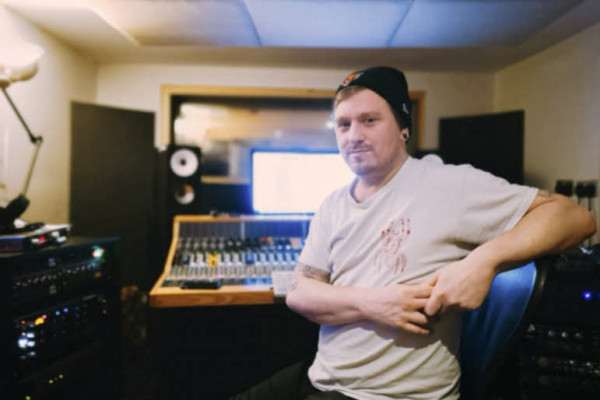
We all know that the music business has been decimated by the pandemic. 99.9% of bands rely on tours, merch and other physical sales to make any money whatsoever these days and it’s been extremely hard to keep that going for obvious reasons. The other thing that bands need to keep doing is making music to keep their fan base engaged. And for that, most bands or musicians will need a producer.
Simon Small plays in London-based punk band Apologies, I have None, but he’s also a successful producer in his own right, having worked with artists including MONO, The Front Bottoms, Black MIDI, Ithaca, John Illsley (founding member of Dire Straits) and more besides, even extending to Broadway and West End artists. Punknews' Sam Houlden spoke to him about working in the current situation and how things have changed.
Hey man. So have you had to adapt ways of working massively and have they been easy changes to make? Simon: I’m normally quite old school in the way I work. I was the teaboy and the only one at my first job who knew how to use a computer when I started out. At our studio we’re now down to one client in at a time which is obviously a big difference, but we can live stream the audio to other people who are involved as we’re working. Also, we’re having to actually enforce rules which maybe isn’t so typical for a studio environment! Working with bands still feels fun and being able to actively create makes it easier to forget everything else that’s going on outside.
Has the whole pandemic impacted your schedule or have you been able to keep working throughout? Simon: The first month of the pandemic I was pretty freaked out. I had a whole year of records booked in to produce, foreign tours and everything…then over pretty much a weekend it all got postponed or cancelled. It was kind of scary.
But you’re back at it now! Have you found that the wider situation has affected the people you’re working with creatively? Simon: Absolutely. I’ve been working with a band recently and there was a noticeable change in that they became unbelievably productive! They finished writing the album really quickly and then came in one at a time and just smashed out the album. They were great!
Some people have felt negative effects as well, I gather. Have you seen that? Simon: With myself, the first half of 2020 I found it really hard. But then in the second half of the year I started working on electronic music. I’ve dipped my toe in it before, but I started getting really into it, making sample packs to sell and then me and some friends have ended up doing little challenges like writing a song every day or stuff like that and it’s made me really get back into writing and making music in a big way
So I’ve got to ask, are you working on more Apologies material? Simon: We write really slowly as a band! We’re still a band and we’re still writing, but getting together as a group has been more than a little difficult obviously. But recording Pharmacie was probably my favourite thing I’ve ever worked on. It was a pretty stressful, hard and long period. We re-recorded it because we wanted it to sound different then ended up re-writing some of the songs. But as we recorded and produced it all ourselves I was really satisfied and proud of what we’d made.
When it comes to the production process, has this been demystified a bit in recent years and if so, is that a good thing? Simon: I really like the fact that people can get access to production software. The biggest impact for me is that people are well prepared. They’re used to playing with metronomes, they have more ideas, they know about plug-ins and that kind of stuff so I see it as a really positive thing. Though you will still get people coming in and saying they want something to sound ‘lo-fi’ but they don’t actually mean that. Part of the process is connecting the band with the kind of production they want. Finding out what it is that they truly want and helping translate that.
You mentioned you’ve also worked on a lot of different stuff over the years and especially in lockdown? Simon: I’ve worked on a lot of different stuff. I think working with old school people means I’ve been pretty versatile. I’ve worked with people from Dire Straits, Thunder, I’ve worked on folk stuff, and now I’ve worked on a lot of musical theatre stuff. It’s been cool to meet so many people who I never would have otherwise. But the people are just the same. You get the DIY guys even in musical theatre. They’re basically the same people just in different genres. I love hearing a musical theatre group sound great. If the drums are banging, the guitars are loud and the strings sound great, then it’s awesome.
I guess that can only help with the writing process for your own stuff as well? Simon: We in the band write a lot of different stuff and we listen to a lot of different stuff. We end up playing a lot of heavy festivals and a lot of people are like “What are you doing here?” But we’re just like “We’re going to see all these bands, this is sick!”